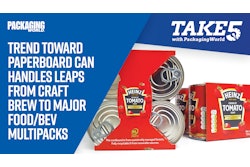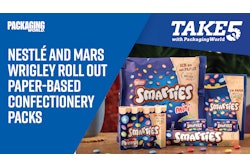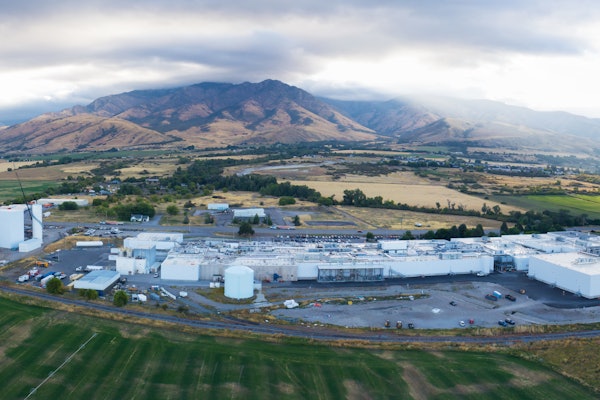Quick hits:
- B&G Foods reduces water usage by 19.5% despite a 38% increased production volume
- Smithfield to save more than $1 million over five years with a switch from cardboard to reusable plastic totes
- Conagra Brands works with vendor to delaminate cups, prevents 80,000 lb per month from going to landfill.
Related to this episode:
- Digital Innovation Production Amid the COVID-19 Pandemic
- Nestlé Partners With the Innovation Center for U.S. Dairy Net Zero Initiative
- Gain an in-depth look at PMMI's research on automation and hear from experts on industry topics by visiting PMMI's Business Intelligence video library.
 | Read the transcript below: |
I’m Joyce Fassl, editor-in-chief of ProFood World. Each year, ProFood World’s Sustainability Excellence in Manufacturing Awards recognize leading projects undertaken by food and beverage processors. Given for one-time projects, as well as ongoing programs, the awards honor companies and individuals that seek to go beyond environmental compliance.
In the Programs category, a first place award goes to B&G Foods’ Cincinnati Crisco facility. In 2020, the plant implemented several water-reduction projects, including the revision of temperature settings for process operations; installation of an air-cooled, air handling unit in place of a water-cooled unit; and implementation of program changes to automate water valve shutoffs. These changes resulted in a reduction of water usage by 19.5% versus the prior year, The 2020 project’s return on investment was achieved in four months.
In second place in the Programs Category, we have a tie from two Conagra Brands facilities.
At the company’s Waterloo, Iowa, facility, “stars and bars” are small pieces of plastic created when formed cups are cut and separated. They have been a recycling challenge, because a foil lid stock is attached to the plastic cup. Now, the plant’s material supplier is working with a recycling center who can delaminate the cups, eliminating about 80, thousand pounds per month from going to landfill.
The other second place winner from Conagra Brands, involves compressed air, steam and vacuum leak reduction at its Menomonie, Wisconsin, facility. Here, an imager detects compressed air and steam leaks, and provides a survey for every leak detected, including an ultrasonic picture showing exactly where the leak is, the rate of the leak, and the associated annual kWh savings. Return on invents was achieved in 6 months.
In third place is Conagra Brands’ Fennville, Michigan, plant focused on water reduction by replacing valves to limit losses, which will save money in electricity costs, while another project allows water from cherry grower trucks to be reused in the plant’s chilled water system. The investments were minimal compared to the saving achieved.
In the Projects category, a first place Sustainability Excellence in Manufacturing Award, goes to Smithfield Foods’ Sioux City, Iowa, facility where the goal was to reduce cardboard usage, at its source, and decrease the amount of cardboard sent to landfill or recycled. A switch away from cardboard to reusable plastic totes and baskets not only saves money, but also reduces cardboard sent to landfill. Projected savings over five years are expected to be more than $1 million.
There is a tie between Conagra Brands and Smithfield for the second-place award. Smithfield Foods’ Kinston, North Carolina facility uses air knives on two of its packaging lines to remove moisture before applying code dating, but air was discharged continuously, even if product was not coming down the line. The simple change of installing photo eyes and timers on its air knives, allows the facility to stop air to the knife when it is not needed, providing compressed air energy savings.
Conagra Brands’ second place award in the Projects Category goes to the Maple Grove, Minnesota facility. Working with partner vendors and contractors, the plant incorporated a laser measurement to automatically trigger its paper splicer, allowing it to use more of the paper on the end of the roll. This project saves a fraction on each roll, but over the course of the year equals approximately 35 tons of waste.
In third place Projects Category, Smithfield Foods lowered its cost per piece of netting used to apply smoke to hams, by increasing the length of netting per case. The Kinston, North Carolina facility now benefits from a lower cost per foot of netting and decreased the amount of packaging waste. Based on the plant’s annual volume for hams, the new netting reduces the number of material cases by 2,500, or 2.5 tons of cardboard and plastic saved.
This year, ProFood World added a new category to the awards, to recognize the growing importance of processor and supplier partnerships. The winners are Liffey Meats and Graphic Packaging International. The partnership will supply 2 million PaperSeal tray units annually to Lidl. The packaging includes a fully lined, cut, and glued PaperSeal tray. This is a barrier-lined paperboard alternative to traditional plastic, vacuum skin packaging. The new Lidl meat product, made exclusively for the Irish market, will feature Angus meats. The partnership resulted in a plastic reduction of approximately 45 tons annually.
There are two ways for you to learn more details about all of these projects. You can read about them in the August issue of ProFood World, or you can meet the winners in person, at Pack Expo Las Vegas on Monday, September 27 at the Processing Zone Innovation Stage. The session begins at 3:30 pm.
Hope to see you in Vegas, and thanks for watching.



















